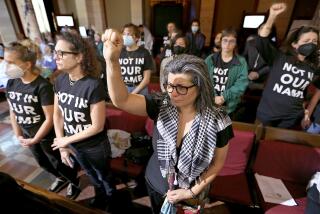Presbyterian Church finds middle ground in Middle East debate
- Share via
A week ago, the Presbyterian Church USA seemed headed for a bruising, polarizing battle over a report on the Middle East that sharply criticized Israel. On Friday, meeting in Minneapolis, the church’s General Assembly overwhelmingly passed a resolution that seemed to placate nearly everyone on both sides of the issue — a “miracle,” some said, that offered hope to those who see the Mideast as hopelessly deadlocked.
The church’s adoption of the report by its Middle East study committee was not without pointed language, including a denunciation of the Caterpillar company for allowing its equipment to be utilized for “nonpeaceful” uses by Israel. (Caterpillar, whose bulldozers have been used by Israel to knock down Palestinian homes, issued a statement in response saying that it did not “condone the illegal or immoral use of any Caterpillar equipment.”)
The report also affirmed previous positions of the church, including a call for the U.S. to withhold aid to Israel if it builds new West Bank settlements.
But gone were calls for divestment in Caterpillar; references to Israeli “apartheid”; and the endorsement of a Palestinian Christian document that called for a boycott and international sanctions against Israel, and described the Israeli occupation of Palestinian territory as “a sin against God and humanity.”
Several Jewish organizations closely monitored the Presbyterian convention and lobbied the study committee. After the vote, the groups’ representatives expressed deep relief with the changes, in particular praising a decision by the church to seek out eight “narratives” — four by Palestinians and four by Israelis — that will express the diversity of voices in the region.
“To me, that’s tremendously exciting, and everything that the Jewish community could have wanted,” said Rabbi Yitzchok Adlerstein, director of interfaith affairs for the Simon Wiesenthal Center in Los Angeles.
The Anti-Defamation League issued a statement saying the church has “averted a rupture with the Jewish community.”
The resolution drew warm praise from across the spectrum of the Presbyterian Church, including people who have been strong critics of Israel and supporters of the Palestinian cause. “We stand together in support of the report,” wrote four prominent Presbyterians, including representatives of organizations that are on opposite sides of the Israel-Palestinian debate. The letter, to the independent newsletter the Presbyterian Outlook, said the report offered “a new way of approaching this intractable problem and, indeed, a new way of being the church.”
Ron Shive, who chaired the study committee, said he thought its work was a model for bridging difficult political gaps. “In the past we’ve come in, we’ve circled the wagons, we’ve built walls between this camp and that camp,” he said. “And we came in this time the same way ... but the amazing thing was, we were able to build consensus between people who had never agreed before.”
He said he didn’t think the Presbyterians could be accused of watering down a “tough-on-Israel” document, but rather strengthening it with, for instance, a reaffirmation of Israel’s right to exist within secure borders. “I don’t think that’s watering down,” he said. “I think that’s listening to our Jewish partners and saying, ‘This is something that needs to be in the report.’ ”
mitchell.landsberg@latimes.com
More to Read
Sign up for Essential California
The most important California stories and recommendations in your inbox every morning.
You may occasionally receive promotional content from the Los Angeles Times.













